Community immunity happens when a sufficient proportion of a population (the percentage varies by disease) is immune to an infectious disease through vaccination or prior illness to make its spread from person to person unlikely.
Community immunity makes it possible to protect our most vulnerable populations from a disease, including those who can’t be vaccinated, such as newborns or those who have compromised immune systems.
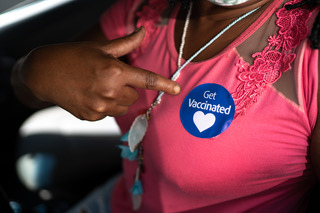
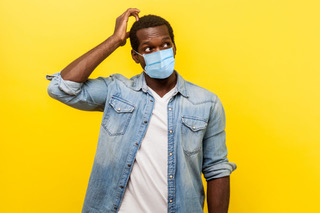
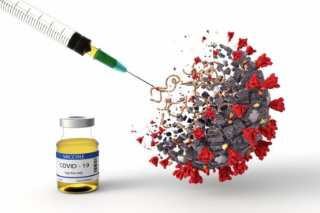
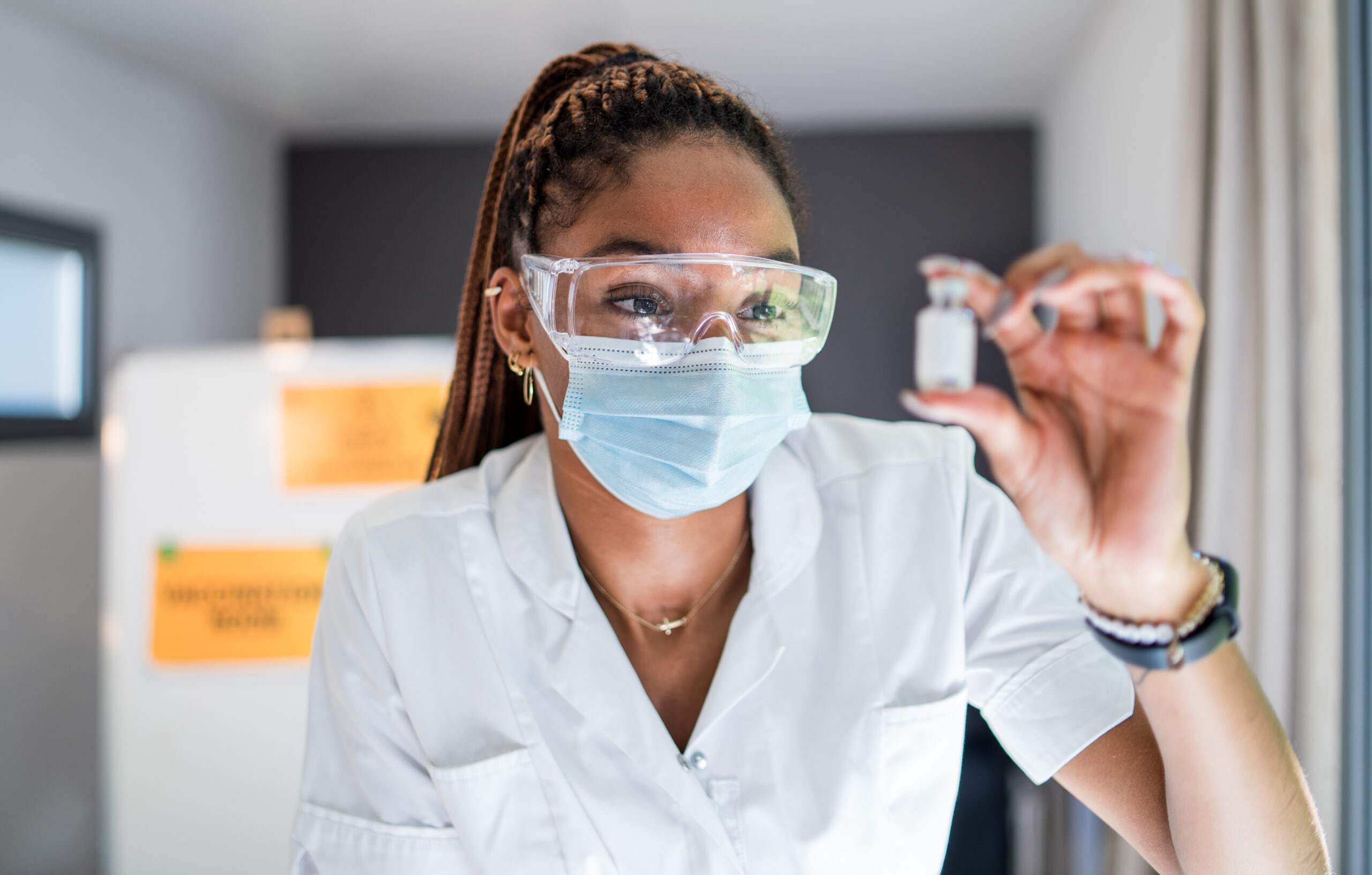
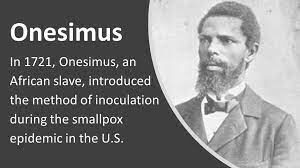 Onesimus was an African-born slave who first introduced variolation (early inoculation) to the city of Boston and to the remainder of New England in the 1700s. Variolation was the initial way of immunizing people against smallpox. The process was undertaken by purposely immunizing an uninfected healthy person with infectious tissue or fluid from a person who had smallpox.
Onesimus was an African-born slave who first introduced variolation (early inoculation) to the city of Boston and to the remainder of New England in the 1700s. Variolation was the initial way of immunizing people against smallpox. The process was undertaken by purposely immunizing an uninfected healthy person with infectious tissue or fluid from a person who had smallpox.
Through conversation, Cotton Mather, an influential minister in Boston who had bought Onesimus gathered information of how variolation was practiced on himself and others back where he was from in Africa.
After his conversation with Onesimus, Mather took on researching all about variolation, through his findings he pushed for variolation to be practiced amongst the colonies and later on led to more acceptance of this practice. Onesimus played a key role in the understanding and what are now known as vaccines.
1716
1721
 Dr. Kizzmekia Corbett, is a senior research fellow who’s spent the past 6 years working with in the National Institute of Allergy & Infectious Diseases’ Viral Pathogenesis Laboratory (VPL)
Dr. Kizzmekia Corbett, is a senior research fellow who’s spent the past 6 years working with in the National Institute of Allergy & Infectious Diseases’ Viral Pathogenesis Laboratory (VPL)
For the past 6 years, her work has focused on coronavirus biology and vaccine development…[her team] made the first spike protein that was the basis for diagnostic assays, antibody discovery and vaccines. She’s been central to the development of the mRNA vaccine and Lilly monoclonal antibody that were the first to enter phase 1 and phase 2 trials in the U.S. As the vaccine unit’s team leader for coronavirus research, Corbett credited scientific groundwork for the mRNA vaccine’s sprint to clinical trial.
“The work we’ve done on SARS-CoV-2 is a proof of concept for that approach,” she continued. “I like to call it the plug-and-play approach, but the basic idea is that we had so much knowledge based on previously done work by ourselves and other labs that we were able to pull the trigger on vaccine development and start the ball rolling toward a phase 1 clinical trial.”
Communities of color have withstood a long history of abuse and bias by medical professionals and government agencies that has left them distrustful of government and healthcare institutions. These practices include experimentation on black bodies (living and the dead), eugenics and forced sterilization, and bias in pain assessment – among many others.
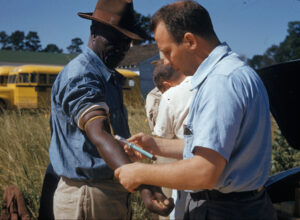
Many of us have heard of the Tuskegee experiment – but a lot of us don’t know the details or the importance to vaccination efforts in communities of color. The Tuskegee Study of Untreated Syphilis has impacted why many communities of color feel hesitant in taking vaccines or engaging in many medical-related activities in relation to the government and healthcare system.
A team of researchers from Tuskegee Institute conducted a study in which 400 black men with syphilis were deliberately left untreated in exchange for the promise of free healthcare. Even after penicillin was established as an effective treatment for syphilis, and informed consent was established as a hallmark of clinical trials, the men continued to go without treatment, and the study continued.
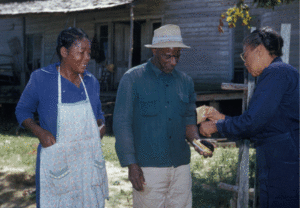
The Tuskegee study has had significant influence on Black Americans’ mistrust of health care institutions, especially as it relates to vaccination. But a recent study proves this is not the only culprit – but that current bias in the system must also be addressed.
To make sure unethical research practices like the Tuskegee Study do not happen again, many changes and procedures were put in place and are still used today to make sure the safety and health of study participants are prioritized.
mRNA Vaccine Involvement of Diversified Communities
Because of the increased risk of COVID-19 to minority communities, It was important that U.S. clinical trials of the COVID-19 vaccine enroll a volunteer population that at least reflects the diversity of the U.S. population, or more ideally—reflects the population of those at increased risk of COVID-19.
The NIAID-funded COVID-19 Prevention Network (CoVPN) is working with stakeholders to reach priority populations, including Native Americans, Black Americans (including African Americans), the Latinx community, people who are at higher risk of exposure to SARS-CoV-2 infection due to occupation, people with pre-existing health conditions, people living in assisted living facilities and communities experiencing health disparities.
The NIH Community Engagement Alliance (CEAL) Against COVID-19 Disparities is conducting outreach and seeking input from communities to raise awareness about COVID-19 and to address misinformation and mistrust about the pandemic and efforts to combat it. CEAL also is working to ensure that COVID-19 prevention and treatment clinical trials include racially and ethnically diverse communities most affected by the pandemic.
Vaccines have proven to be a significant achievement in the progress of health in general. More than 100 million cases of diseases have been prevented since 1924 because of vaccinations. A disease such as polio has been eradicated in most of the world today. The annual number of cases worldwide have declined more than 99.9% since 1988. If it was not for vaccinations, over 18 million currently healthy people would have been paralyzed from the polio virus.
Viruses and bacteria enter the human body and begin to attack and multiply. This is what is called an infection, which can lead to illness. The first time the body comes into contact with a virus or bacteria it takes some days for the immune system in the body to gather and use the tools to fight it off. Once the infection is cleared out, the body has kept some “memory cells” to remember how best to fight off the disease quicker and more effectively if it comes in contact with it again in the future.
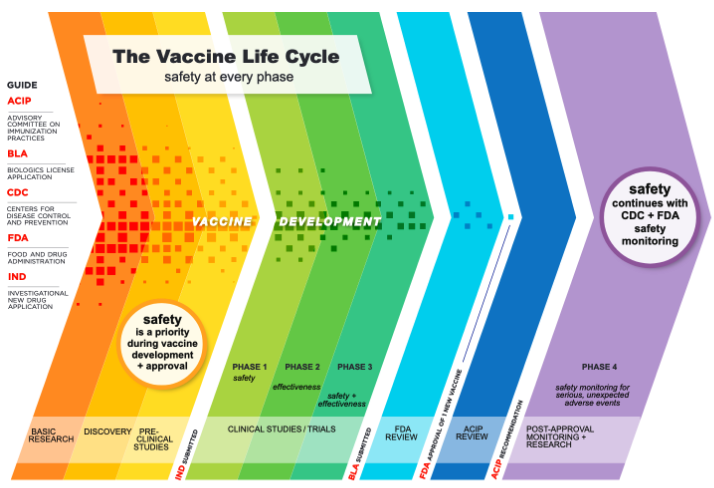 All vaccines used in the U.S. must go through an intense process of testing before being approved by the US Food and Drug Administration. After the production of a vaccine and its approval the Centers for Disease Control and Prevention, FDA and healthcare professionals work together to monitor the safety and efficacy of the vaccines. There are three systems in place to monitor vaccines. Vaccines have to go through clinical trials where people from diverse backgrounds, such as age, ethnicity, gender, medical history & health status, volunteer to test the efficacy of the vaccine. To understand the right dosage, and monitor what side effects may come up.
All vaccines used in the U.S. must go through an intense process of testing before being approved by the US Food and Drug Administration. After the production of a vaccine and its approval the Centers for Disease Control and Prevention, FDA and healthcare professionals work together to monitor the safety and efficacy of the vaccines. There are three systems in place to monitor vaccines. Vaccines have to go through clinical trials where people from diverse backgrounds, such as age, ethnicity, gender, medical history & health status, volunteer to test the efficacy of the vaccine. To understand the right dosage, and monitor what side effects may come up.
Currently, there are two types of vaccines available for COVID-19, messenger RNA (mRNA) vaccines that include the Pfizer-Biotech and Moderna vaccines, and a viral vector vaccine, made by Johnson & Johnson:
mRNA Vaccines – mRNA vaccines have been developed and implemented for earlier coronaviruses like SARS and MERS. Instead of putting weakened or activated germs in the body like traditional vaccines, the mRNA vaccine teaches cells how to make a protective protein. Should the real virus enter the body, that new protein triggers an immune response that produces antibodies and prevents us from getting sick.
Viral Vector Vaccines – Viral vector vaccines piggyback the instructions to fight the coronavirus onto a separate and different virus, called an adenovirus. The virus is not alive and therefore cannot infect the individual receiving the vaccination. Viral vector vaccines have already been used to fight a number of diseases, including Zika, influenza viruses, HIV, malaria and Ebola.
Both Vaccines Had a Blueprint – The existing “blueprints” from previous vaccines enabled vaccine manufacturers to develop the COVID-19 vaccine more quickly. Dr. Toro notes that this was one of several reasons they were able to develop these vaccines in “10 months versus 10 to 15 years.”
Learn more about how the body fights infection.
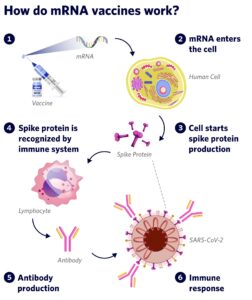
The immune system is activated once we get a vaccine. The vaccine aids in the process of learning how to defend itself if it comes in contact with COVID-19, with the advantage of not having a real infection.
The COVID-19 vaccines do not contain a live virus.

Getting a COVID-19 vaccine means taking care of yourself so that you, your family, and others are protected from getting severely ill. Getting vaccinated is the gateway to getting back to who and what we love and miss the most.
COVID-19 vaccines can protect you, your family, and your community.
FREE Rides for Seniors
Any Fulton County senior who has a confirmed vaccination appointment can call the Senior Services STARline at 404-613-6000 to schedule transportation.
FREE Lyft Rides to Vaccine Appointments – From now until June 30, 2022
The Vaccine Access Program is a partnership between Lyft and United Way 2-1- 1 to help ensure that transportation gaps do not prevent Georgians from being able to receive the COVID-19 vaccine. Anyone in need of vaccine transportation can contact United Way 2-1-1 of Greater Atlanta to receive a free ride from Lyft! If your organization is having a vaccine event, or you know of someone in need of a Lyft, please let them know to contact United Way 2-1-1 to schedule a free ride to vaccine appointments. How to reach United Way 2-1-1:
Georgia residents who are currently homebound due to an ongoing physical or mental disability and are unable to travel to a COVID-19 vaccination site can request to receive vaccination at their home by phone or email. To leave a voicemail request, please call 888-572-0112 and someone will return your call to obtain additional information. To request services by email please email HVS@dph.ga.gov with the following information for the person who requires at home vaccination:
The contact phone number will be used to obtain additional information and schedule the vaccination.
WHAT TO EXPECT AFTER GETTING COVID-19 VACCINE
WARNING AGAINST POSTING YOUR COVID-19 VACCINE CARD
KEEP YOUR VACCINATION CARD
When you get your first dose (if Pfizer or Moderna), you will get a vaccination card to show you when to return for your second dose of the COVID-19 Vaccine. Remember to bring your card when you return.
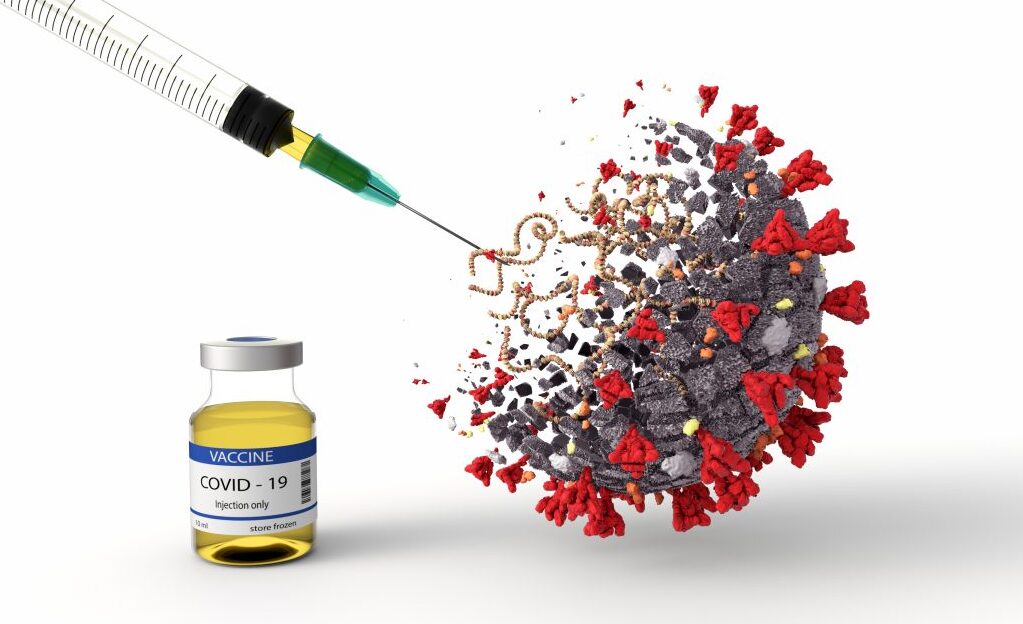
FACT:
The COVID-19 vaccines have NO LIVE VIRUS in them. Typically, vaccines contain thimerosal, aluminium salts, acids, sugars, gelatin, egg protein, formaldehyde, neomycin, even mRNA vaccines have the basic components of protein, sugar, salts, fats and acids. The difference is that for mRNA vaccines a protein called ‘spike’ protein replaces actual viruses you would find in the typical vaccine.
FACT:
The science behind COVID-19 vaccines has existed for decades. Hundreds of millions of people have already received COVID-19 vaccinations with mild to no side-effects, yet 99% of hospitalizations and deaths from COVID-19 are among unvaccinated individuals. The longer you wait, the greater your chance of becoming infected from COVID-19.
FACT:
Myocarditis is inflammation of the muscle of the heart, and pericarditis is inflammation of the tissue that forms a sac around the heart. Millions of doses of COVID-19 vaccine have been given, and there have only been 1,000 cases of heart inflammation after vaccination against COVID-19 with one of the mRNA vaccines, Pfizer/BioNTech or Moderna – and the majority of these cases have been mild. Doing the math, the Centers for Disease Control and Prevention (CDC) notes that for every million doses given, there have been 67 cases of heart inflammation in boys 12 to 17 (nine in girls of that age group), 56 in those aged 18 to 24 (six in girls), and 20 in males 25 to 29 (three in girls). That means the risk is quite low. Experts are particularly worried about the new COVID-19 variants, which seem to spread more quickly and cause more severe disease. The available vaccines do appear to protect against these variants, and the vast majority of current hospitalizations and deaths are in people who are unvaccinated.
FACT:
There is research being done for better understanding the link between COVID-19 vaccinations and women’s monthly cycles. Women’s monthly cycles can change for a countless number of reasons. Increased stress, changes in weight and exercise, as well as other major lifestyle changes can affect menstrual cycles. These changes are common during the COVID-19 pandemic. Studies have also shown that some women who had COVID-19 had changes in the length and flow of their menstrual cycles.
FACT:
There is no medical evidence that any of the vaccines leads to erectile dysfunction, sterility, infertility either in men or women. There are no detrimental changes in sperm counts and other fertility measures after vaccination in any study so far.
FACT: COVID-19 vaccines can cause MILD side effects after the first or second dose – these are normal. Most side effects happen within the first three days after vaccination and typically last only 1 to 2 days. Side effects include:
Millions of people in the United States have received COVID-19 vaccines, and have only experienced normal mild side-effects. And these vaccines have undergone the most intensive oversight and safety monitoring in U.S. history. Trusted Black Doctors like Dr. James Hildreth, President & CEO of HBCU, Meharry Medical College, member of the FDA’s vaccine advisory committee, oversaw the vaccine approval process. Monitoring includes using both established and new safety monitoring systems to make sure that COVID-19 vaccines are safe.
CDC has developed a new tool, v-safe, to help us quickly find any safety issues with COVID-19 vaccines. V-safe is a smartphone-based, after-vaccination health checker for people who receive COVID-19 vaccines.
FACT:
Vaccines offer a layer of protection to reduce the risk of severe illness from COVID-19. As of August 2, there had been 7,525 vaccinated people who were hospitalized or died who had also tested positive for coronavirus—out of more than 164 million fully vaccinated Americans. That equals .00003 percent. Additionally, 99.5 percent of all deaths from COVID-19 are among the unvaccinated. Vaccines DO work.
FACT:
People with underlying conditions or a history of anaphylaxis shock should consult their doctor, but COVID-19 vaccines are for everyone 12+. The COVID-19 vaccines used in the United States included the largest clinical trials of any vaccine ever. These trials included people of all different backgrounds, races and ethnicities. Blacks represented 10% of both the Pfizer and Moderna clinical trial participants, and 14% of J&J participants. Participants with underlying health conditions or compromised immune systems such as allergies, obesity, heart disease, and cancer, represented over 40% of trial participants.
FACT:
This rumor started after a report claimed inaccurately, that the SPIKE protein on the coronavirus was the same as another protein called syncytin-1 that is involved in the growth and attachment of the placenta during pregnancy. It was quickly proven false. COVID-19 vaccines do not affect the reproductive system and there is no evidence linking COVID-19 vaccinations to infertility or miscarriage. There is no evidence that COVID-19 causes any pregnancy issues, nor are female and male infertility side effects of getting the vaccine. However, there IS data that shows that pregnant women are at higher risk of being hospitalized if they get COVID-19.
FACT:
Even if you are fully-vaccinated, you may also need a Booster shot. Studies have shown that a person infected with the Delta variant of COVID has roughly 1,000x more copies of the virus in their respiratory tracts than a person infected with the original strain, which for a novel virus, makes it a lot more deadly. CDC guidelines recommend that people who meet one of the following criteria can get the booster shot;
FACT:
FACT:
Although many steps are involved in the process of having a vaccine available to the public, they no longer take many years to develop. In fact, the first case of H1N1 virus (aka swine flu) was recorded in April of 2009. There was a vaccine by November (8 moths).
FACT:
There is no vaccine “microchip” and the vaccine will not track people or gather personal information into a database. This myth started after comments made by Bill Gates from The Gates Foundation about a digital certificate of vaccine records. The technology he was referencing is not a microchip, has not been implemented in any manner and is not tied to the development, testing or distribution of the COVID-19 vaccine. Vaccines are made to fight against disease and not to monitor or track people.
FACT:
COVID-19 vaccines don’t interfere with your DNA and cannot change it. The COVID-19 vaccines that have been approved are the mRNA vaccines and a viral vector vaccine. These vaccines provide a person’s cells with instructions to build protection to fight and protect the body against the COVID-19 virus.
FACT:
Many health issues that are well associated with a lack of physical activity and poor diet — such as overweight, obesity, diabetes, and heart disease — are also associated with greater risk of severe illness and death from COVID-19. In addition, vitamins, zinc, and other over-the-counter supplements are great ways to boost your immune system in order to have a strong immune response to possibly reduce the risk of severe illness and death from COVID-19. However, having a good diet, exercising and taking supplements does not mean you will not get COVID-19 or get cured from COVID-19.

Getting immunized against COVID-19 will keep most people from getting sick and help prevent spreading the virus to others. Even in a rare case where one does catch the virus, the vaccine will likely prevent you from becoming seriously ill. Clinical trials have shown the COVID-19 vaccine to be 90% effective in real-world conditions.
With the majority of the population vaccinated, there will be enough protection against the spread of COVID-19 in communities and herd immunity will be achieved. Getting vaccinated will allow you to gather safely with others outside of your household, and participate in activities you’ve missed the most – such as meeting up at the Big Game, seeing family and friends, attending religious services, and getting children back in school full-time.
Yes, both the Pfizer and Moderna vaccines contain mRNA.
mRNA (also known as messenger ribonucleic acid) helps build protection for someone’s immune system through replicating the exact shape of a virus without containing any part of the virus. mRNA do not change or modify the DNA/genetic makeup of people.
The immune system is activated once we get a vaccine. The vaccine aids in the process of learning how to defend itself if it comes in contact with COVID-19, with the advantage of not having a real infection. The COVID-19 vaccines do not contain a live virus.
Before the approval and authorization of a vaccine it must go through a rigorous process of evaluation and review to ensure the safety and effectiveness by the U.S. Food and Drug Administration (FDA). If the vaccine shows signs of not being safe or effective, it is not approved or used.
The FDA and CDC continuously monitor the COVID-19 vaccine to ensure its safety. Experts have been studying and working with mRNA vaccines for decades, way before diseases such as flu, Zika and rabies. More than 259 million doses of COVID-19 vaccines have been given to people, with tens of thousands of people having already participated in clinical trials.
In the past, vaccines have taken many years to develop. However, the relatively quick development of this vaccine does not mean safety measures were skipped. There are several reasons why the COVID-19 vaccines were developed faster than other vaccines:
The COVID-19 vaccines used in the United States included the largest clinical trials of vaccines ever. These trials included people of all different backgrounds, races and ethnicities. Blacks represented 10% of both the Pfizer and Moderna clinical trial participants, and 14% of J&J participants. Participants with underlying health conditions or compromised immune systems such as allergies, obesity, heart disease, and cancer, represented over 40% of trial participants.
Medical experts and doctors strive to ensure the vaccine is safe and effective for as many people as they possibly can. Due to differences in individuals, people may respond differently to vaccines based on various factors such as age, gender, health conditions and other factors therefore having a diverse representation of varied groups in the clinical trials.
No, the COVID-19 vaccines being used will not and cannot infect anyone with the COVID-19 virus. Recent studies show COVID-19 vaccines are 90% effective against preventing illness from COVID-19 in real-world conditions. The vaccines do not have any form of live SARS-CoV-2, the COVID-19 causing virus. The vaccines serve the purpose of protecting and preventing individuals from potentially getting infected. Being vaccinated means your body will be creating an antibody, in efforts to protect someone against COVID-19 if they come into contact with the virus.
The COVID-19 vaccines have NO LIVE VIRUS in them. Typically, vaccines contain thimerosal, aluminium salts, acids, sugars, gelatin, egg protein, formaldehyde, neomycin, even mRNA vaccines have the basic components of protein, sugar, salts, fats and acids. The difference is that for mRNA vaccines a protein called ‘spike’ protein replaces actual viruses you would find in the typical vaccine.
All three vaccines currently available have fact sheets for recipients and caregivers that list the ingredients of each vaccine. Those factsheets can be found at:
Yes, both the Pfizer and Moderna vaccines contain mRNA.
mRNA (also known as messenger ribonucleic acid) helps build protection for someone’s immune system through replicating the exact shape of a virus without containing any part of the virus. mRNA do not change or modify the DNA/genetic makeup of people.
The immune system is activated once we get a vaccine. The vaccine aids in the process of learning how to defend itself if it comes in contact with COVID-19, with the advantage of not having a real infection. The COVID-19 vaccines do not contain a live virus.
All COVID-19 vaccines currently available in the US are effective at preventing COVID-19 in clinical trials, and research provides growing evidence that mRNA COVID-19 vaccines offer similar protection (90%) in real-world conditions. Some people who are fully vaccinated against COVID-19 will still get sick because no vaccine is 100% effective. Experts continue to monitor and evaluate how often this occurs, how severe their illness is, and how likely a vaccinated person is to spread COVID-19 to others.
Even if you are fully-vaccinated, you may also need a Booster shot. Studies have shown that a person infected with the Delta variant of COVID has roughly 1,000x more copies of the virus in their respiratory tracts than a person infected with the original strain, which for a novel virus, makes it a lot deadlier.
At the moment, the Pfizer-BionTech COVID-19 vaccine is the only COVID-19 vaccine that has been approved to be administered for a booster shot. The recommendations for COVID vaccine booster shots are:
Both the Pfizer and Moderna vaccines require two doses. The Pfizer vaccine doses are administered 3 weeks (21 days) apart, and the Moderna vaccine doses are given 4 weeks (28 days) apart. The first dose offers partial protection and the second acts as a booster. Both doses are needed to get the most protection the vaccines have to offer against COVID-19.
The Johnson & Johnson vaccine is a single dose vaccine. All three COVID vaccines currently available are administered intramuscularly (into the muscle, just like a flu shot).
According to the US Centers for Disease Control and Prevention, the second dose of the vaccine can be administered up to 42 days, or six weeks, after the initial inoculation.
We do not yet know how long protection lasts for those who are vaccinated. What we do know is that COVID-19 has caused very serious illness and death for a lot of people. If you get COVID-19, you also risk giving it to loved ones who may get very sick. Getting a COVID-19 vaccine is a safer choice.
Yes, you should be vaccinated regardless of whether you already had COVID-19. Experts do not yet know how long you are protected from getting sick again after recovering from COVID-19.
Commonly known side-effects of the COVID-19 vaccine may include pain, swelling, and tenderness on the arm where you get the shot. It is also possible to feel tired, muscle pain, chills, fever, nausea, and headaches. The side effects of the COVID-19 vaccines are short term mild or moderate. These side effects last anywhere from one to two days.
These symptoms are in line with side effects some people experience from some other vaccines, including the flu shot and the vaccine to prevent shingles. Vaccines work to fight disease by producing an immune response within the body, and sometimes that means flu-like symptoms occur as your body responds to the vaccine. It is normal and expected.
Experts are finding out more and more about COVID-19. In the beginning of the pandemic the data showed that children were less likely to get COVID-19. As the pandemic has progressed, the findings show that children can get severely ill from COVID-19.
There has been an increase in COVID-19 related hospitalizations. The Pfizer COVID-19 vaccine has shown to be even more effective within children between the ages of 12 and 15 in comparison to adults, with 100% effectiveness. Where the clinical trials showed 95% effectiveness for adults. The best way to protect your child is to get them vaccinated and reduce the spread of the virus within family, schools, and communities.
At this moment in time, the Pfizer vaccine is the only vaccine available for children 12 and older. It is important to be sure when making an appointment for children, to select a day which the Pfizer vaccine will be given at your preferred location.
Yes. The dose of the COVID-19 vaccine given to children is the same for older children and adults.
Yes. The COVID-19 vaccine can be taken even if your child has just taken other routine vaccinations. The COVID-19 vaccine can also be taken at the same time or on the same day as other vaccinations.
The Centers for Disease Control and Prevention (CDC) recommend that you do not give your child pain-relieving medication as it can possibly reduce how the body’s immune system responds to the vaccine. Though, if your child does develop a fever or pain after receiving the vaccine, it is then fine to give them acetaminophen or ibuprofen at the appropriate dose.
The common side effects of the COVID-19 vaccine for children are just like with adults. These side effects include pain at injection sites, tiredness, headaches, muscle and joint pain, and fever. These side effects are usually mild and last anywhere from 1 to 2 days.
Contact your pediatrician if you have any specific health concerns, however if your child does not have any specific health concerns, you can schedule your child’s COVID-19 vaccine appointment without speaking to their pediatrician.
Yes. A parent or guardian will need to give consent at the time of vaccination, if the parent or guardian will not be present, they must provide a consent form signed by parent or guardian.
Yes. women who are menstruating can take the COVID-19 as there are no additional risks with menstruation.
Yes. Both women taking contraceptives and women planning to get pregnant can get the COVID-19 vaccine. There is no data showing health risks of taking the COVID-19 vaccine, with contraceptive-use and planning pregnancy. Women actively trying to get pregnant can be vaccinated.
No. Over 100,000 pregnant people have taken the COVID-19 vaccine. Experts say there has not been any health or safety concerns for the vaccinated pregnant people. There has not been an increased risk of miscarriage amongst people vaccinated against COVID-19. Pregnant people who get COVID-19 are at a higher risk of preterm birth and higher risk of other pregnancy outcomes compared to a pregnant person without COVID-19. In addition, if a pregnant person does get COVID-19, they are at higher risk of being severely ill.
Based on the current data, it is safe for a breastfeeding mother to get the COVID-19 vaccine. The vaccines do not have the live COVID-19 virus, so it does not put the baby at risk.
The FDA-authorized COVID-19 vaccines can be received by most people with pre-existing health conditions. It is recommended for adults of any age with underlying medical conditions such as diabetes, high blood pressure and other medical conditions to get vaccinated as they are at higher risk of severe illness from COVID-19.
People who have weakened immune systems, autoimmune conditions, previously had Guillain-Barre syndrome or Bell’s palsy, may get the COVID-19 vaccine once they are able to, though information on the safety of the COVID-19 vaccine is not yet available, with research still on going. The COVID-19 vaccine clinical trials included people with underlying medical conditions from diverse demographics and medical conditions. It is important to ask your doctor if you have specific questions.
If anyone with a pre-existing condition has severe allergies to any of the ingredients of the vaccines, it is advised they do not get vaccinated and talk to their doctor.

Empowering parents, caregivers, and Trusted Messengers! The Best Start for Baby + Mom campaign provides essential information on well baby visits and immunizations for expecting mothers and young children, emphasizing that a healthy start for babies also means a healthy mom.
Visit our landing page today for bilingual resources, answers to FAQs about maternal and pediatric vaccines, an immunization locator, and everything you need to support maternal and infant health.